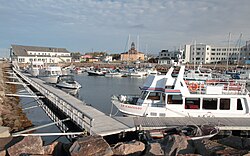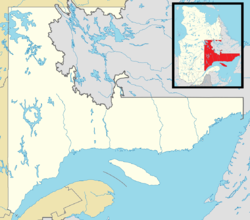Havre-Saint-Pierre, Quebec
| Havre-Saint-Pierre | |
|---|---|
| Municipality | |
 |
|
| Motto: Terre digne de richesses | |
| Location in Côte-Nord region of Quebec. | |
| Coordinates: 50°14′N 63°36′W / 50.233°N 63.600°WCoordinates: 50°14′N 63°36′W / 50.233°N 63.600°W | |
| Country |
|
| Province |
|
| Region | Côte-Nord |
| RCM | Minganie |
| Settled | 1857 |
| Constituted | January 1, 1873 |
| Government | |
| • Mayor | Berchmans Boudreau |
| • Federal riding | Manicouagan |
| • Prov. riding | Duplessis |
| Area | |
| • Total | 3,896.30 km2 (1,504.37 sq mi) |
| • Land | 2,821.65 km2 (1,089.45 sq mi) |
| Population (2011) | |
| • Total | 3,418 |
| • Density | 1.2/km2 (3/sq mi) |
| • Pop 2006-2011 |
|
| • Dwellings | 1,484 |
| Time zone | EST (UTC−5) |
| • Summer (DST) | EDT (UTC−4) |
| Postal code(s) | G0G 1P0 |
| Area code(s) | 418 and 581 |
| Highways |
|
| Website | www |
Havre-Saint-Pierre is a town situated on Pointe-aux-Esquimaux, which is on the Quebec north shore (Côte-Nord) of the Saint Lawrence River in Canada. Located along Route 138 some 200 kilometres (120 mi) east of Sept-Îles, it is the largest town and seat of the Minganie RCM, and home to many government, municipal, and regional services.
Historically, the town's first inhabitants came from the Magdalen Islands in the nineteenth century. As a result, the people of the town speak a dialect much more closely related to Acadian French than to Quebec French.
Other important geological features near the town include the Romaine River to the north and west, les Chutes Manitou, on the Manitou River to the west, l'Ile du Havre, less than a kilometre offshore from the town, and Anticosti Island, which on clear days can be seen to the south of the town.
In 1857, a group of Acadian families from the Magdalen Islands, who had previously been deported from Savannah (Georgia, USA), settled on Eskimo Point (Pointe aux Esquimaux). The first mass was held on June 29, 1857, day of the feast of Saint Peter. In 1872, the Parish of Saint-Pierre-de-la-Pointe-aux-Esquimaux was officially established, the same year its post office opened under the name Esquimaux Point.
In 1873, the place was incorporated as a municipality. In 1924, the post office changed its name to Havre-Saint-Pierre, followed by the town in 1927, in order to focus on the harbor, which characterizes the area, while retaining the original parish name. It remained the largest town on the North Shore until 1936 when it was overtaken by Baie-Comeau.
In spite of its maritime position just above the 50th parallel, Havre-Saint-Pierre has a relatively harsh subarctic climate, with cold winters and cool summers, although the fourth-warmest month of September is relatively close to the 10 °C (50 °F) isotherm to be cold humid continental. The high precitipation brings a lot of snowfall in winter.
...
Wikipedia

